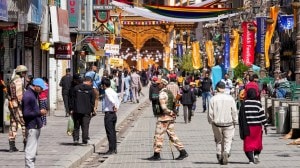Stay updated with the latest - Click here to follow us on Instagram
9 Himachal villages set up model for community water supply scheme
The villages that once struggled to get quality drinking water and always looked towards the governments irrigation and public health department for a solution have now evolved their own model of drinking water schemes.
These villages co-own the drinking water schemes with IPH dept,decide tariff,bylaws
The villages that once struggled to get quality drinking water and always looked towards the governments irrigation and public health department for a solution have now evolved their own model of drinking water schemes. The schemes are partially owned and completely managed by the community.
Tatal,Kima-Chandrawali-Sarguldhar-Kehal and Mateodi (Shimla district); Chadi,Samwad,Kothi (Mandi district) and Salari,Bani and Garli (Kangra district) villages were chosen as pilot sites to test the module for community-managed small-scale water supply schemes by the German Technical Cooperation (GTZ) under its WASH (Water Availability through Self-Help) project.
After our village volunteered to become a shareholder in a drinking water scheme earlier managed by the IPH,the biggest hurdle was to convince the villagers to contribute 10 to 30 per cent of the cost of repair and augmentation of the existing water supply scheme (the rest was contributed by GTZ). We convinced the people by giving them a comparative picture of the cost of medical expenses borne by them on treatment of water-borne diseases and the cost of safe drinking water. It worked wonders. The same strategy came handy in fixing the annual tariff, said Satish Tegta,member of the Village Water and Sanitation Committee (VWSC) of Tatal village.
VWSC members look after the working of the scheme,testing of the quality of water,purchases and social audit and also make and implement bylaws for running the schemes.
Safia Begum of Kehal village in Polia panchayat of Choupal said: The burden of ferrying water and managing the household along with other work is the primary responsibility of women. I tried to convince the village to make life easier for women and also ensure health of their children by consuming clean water.
The nine villages have another big achievement to their credit introduction of the concept of payment for water consumption by each household. This money is ploughed back for operation and management of the scheme and is open to social audit.
Till now people in villages were not open to the concept of paying for water. We have put up an example of how paying for a service maintained and run by the village has led to responsive attitude from the community,which is the reason for the success of the model. This model is a step further in implementing the 73rd constitutional amendment that calls for devolution of functions and tasks of local development to Panchayati Raj Institutions, said the senior programme specialist of WASH.
Principal Secretary,Irrigation and Public Health,Narender Chauhan said after the success of the pilot models,a proposal had been floated to include two blocks Narkanda (Shimla) and Lambagaon (Mandi) for implementation of the model on a larger scale. So far,1,238 schemes have already been handed over to panchayats. Through workshops,other villages are also being counselled on managing these schemes and efforts are on to motivate them to replicate the model, he added







